How To Handle A Security Deposit Dispute

If you are a landlord or a tenant, odds are you have experienced some type of security deposit dispute. This can be tricky as a landlord if your tenant damages your property and denies it. Having no concrete evidence of the damage makes it much harder to settle such an argument and knowing the laws in your state can help put you ahead in the rare event of a lawsuit.
As a tenant, it is important to know when you are at fault and when your landlord is unrightfully deducting from your deposit or attempting to keep it in full. Learning when you are liable for your damages and taking inspections seriously is crucial to preventing a dispute or a lawsuit. The following tips from Rentable will help you whether you are a landlord or tenant.
For Landlords
1. Make Sure The Law Is On Your Side
A tenant’s defense typically begins with questioning your legal right to keep their security deposit. It is important to be familiar with your state laws so you can respectfully solve a dispute with legal reasoning. Be sure to understand where your reasoning comes from and include evidence for it whenever possible. Most commonly, landlords are able to keep or deduct from a security deposit if there is damage to the property beyond reasonable wear and tear or if rent is unpaid.
2. Provide Evidence For Your Deductions
Providing clear, photographic evidence to your tenant is crucial in the event of a dispute. If your tenant believes they have not damaged anything and you fail to back up your claim with evidence, they may be more likely to remain entitled to their deposit in full. Using Rentable’s inspection software can ease the pain of an argument regarding deductions, especially if you have previously stored and dated images of a move-in inspection and the current damage done. Having done this, your tenant is much more likely to accept their deduction and realize your lawful right to their deposit. Additionally, if rent has not been paid up to date, ensure that you have a certified notice sent to the tenant requesting this money and any other necessary evidence of a breach of the lease.
3. Know When To Go To Court
In the worst case scenario, your tenant may try to sue you in small claims court. Having legal reason to keep their security deposit does not necessarily protect you against a lawsuit. The key is to decide if it is worth it to jump through hoops to settle the case in court or to personally settle with your tenant for a sum of money. For instance, if a tenant is suing you over a $50 deduction to their deposit, it may not be worth the time and effort to carry out the dispute in court. Instead, you may decide to pay them the disputed amount to ease the headache. However, if you have legal reason to keep a large chunk of their security deposit, you should be prepared to defend your right to the money in small claims court especially if you know you are fully entitled to the money.
For Tenants
1. Know Your State Laws
Making sure you understand when your landlord is legally entitled to your security deposit is vital to mitigating a dispute. Read your state laws to prepare for the event that your landlord tries to withhold your deposit: know when they are legally required to return it and where they are supposed to store it. In some states landlords are required to keep your security deposit in a separate, interest-bearing account in your name. If they fail to do so, you may be entitled to sue them for triple the amount. If you're unsure where to begin, check out Nolo's thorough state-by-state explanations.
2. Take Move In/Move Out Inspections Seriously
Take the time to fully inspect your unit before moving in. It may seem like your landlord has your unit’s condition documented and organized, but oftentimes this is not the case. After signing your lease, walk around your apartment and take as many photos as you can. Storing and dating photos is important in the event of a dispute and can be done easily through Rentable’s photo storage feature. If there are damaged or broken items in your unit, be sure to notify your landlord before you move in. When it comes time to move out, take equally detailed photos and date them with acknowledgement from your landlord. If anything strikes you as even slightly faulty or off, be sure to take documentation.
3. Make Sure You Have Been A Responsible Tenant
Landlords are typically only able to keep your security deposit for the following reasons:
- Repairs or damages caused by the tenant during the leasing period
- Cleaning the property to its state prior to move-in
- Unpaid rent
In order to prevent the legal deduction of your security deposit, be sure to take special care of your property and follow the guidelines written in the lease for insurance. Taking initiative to care for your apartment is an amazing start: try to clean frequently and notify your landlord if anything becomes damaged or broken. Even if it is caused by you, letting them know as soon as possible will keep you in their good graces. It is important to set reminders for yourself to pay rent on time every month. Rentable’s platform for tenants helps to connect you and your landlord, ensuring you never miss a payment. Lastly, try to take care of small repairs yourself, e.g., small holes in the walls, broken blinds, clogged drains, etc. The more you can fix yourself, the more money you will end up with when the lease ends. Deductions from small repairs can add up and oftentimes landlords overcharge for these types of repairs
If you enjoyed this article, be sure to check out some of Rentable’s other resources at: www.rentable.com. Our platform makes the rental process simple, transparent, and affordable for tenants and landlords alike.

